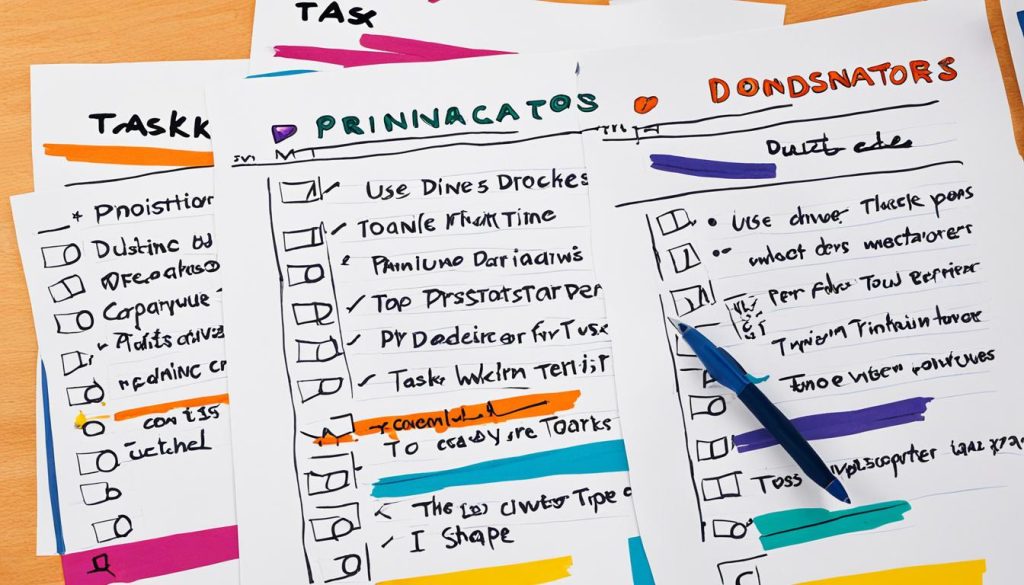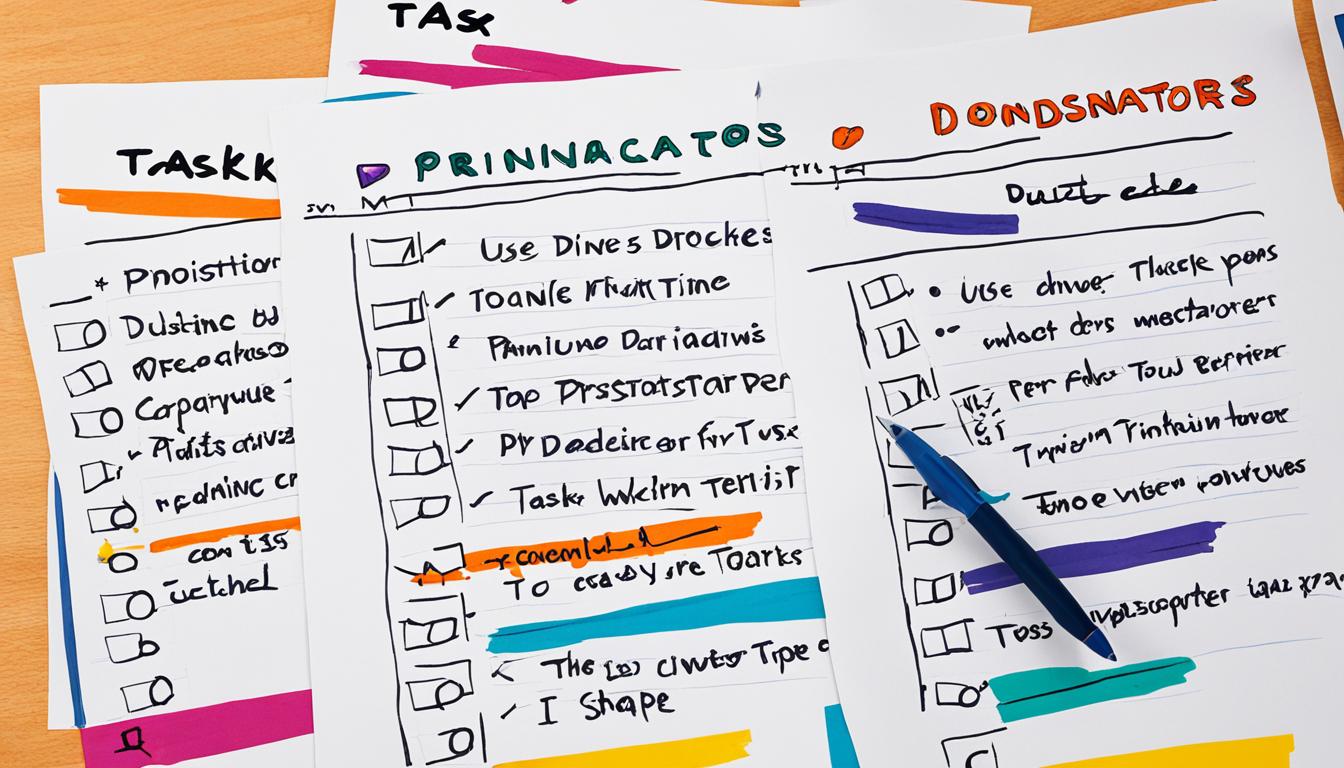Did you know that putting things off might not always be bad? It seems like procrastination, usually seen as negative, could have surprising upsides.
Procrastination often gets a bad rap, known for late nights and stress. Yet, some experts say waiting could spark new ideas. They believe that waiting to the last minute might actually boost how creative or innovative you are.
According to Frank Partnoy, waiting to decide something very last minute can have big benefits. Athletes, especially tennis players, use this strategy to perform better, by reacting at the final moment. There’s also a link between waiting and coming up with unique thoughts. Adam Grant and Jihae Shin found that taking our time might lead to more creativity.
Jos eph Ferrari notes that gentle procrastination can be good for generating new ideas. It’s like giving your brain some time off to work in the background, creating connections you might not see under stress to act right away.
Key Takeaways
- Procrastination, when strategic, can enhance decision-making and performance.
- Professional athletes use delay tactics to improve responses and outcomes.
- Moderate procrastination can stimulate creative thinking and innovation.
- Studies show a strong correlation between procrastination and creativity.
- Ferrari emphasizes the benefits of conscious and deliberate delay.
Understanding Procrastination: More Than Just Delaying

Procrastination is more than just putting off tasks. It’s a big issue with self-control and managing feelings. Many university students, about 50% to 95%, deal with this. It often leads to lower grades and more stress.
Doing well in school needs good time and effort skills. But, lots of students find these skills hard. Some say procrastination is about emotions. This idea is becoming more popular today.
No one completely agrees on why people procrastinate. Some think it’s because of a person’s mindset. They might avoid facing tough feelings while still aiming for their goals. Others say it’s because of things like not feeling sure of yourself, being too sure, looking at things too hopefully, or even having different brain patterns on scans.
Research suggests being flexible in your thinking can help reduce procrastination. So, working on this could be a key step for those who put things off a lot. But, the number of people calling themselves chronic procrastinators has jumped from 5% in 1978 to 26% in 2007. This growth shows procrastination is becoming more of a problem in today’s world.
For a long time, people thought procrastination was just about not having self-control or being bad at managing time. But recent ideas suggest some may procrastinate because they just don’t want to do things, not because they lack willpower. This means putting things off is not simply a small problem; it can really impact how we feel and our stress levels.
There was a belief that people always make choices that are good for them. But, a Nobel prize winner proved that’s wrong. People often make decisions that aren’t the best for them. This adds to the challenge of understanding and dealing with procrastination. It shows there’s a deep link between our emotions, self-control, and procrastination.
Types of Procrastinators: Task-driven vs. Deadline-driven
Learning about the types of procrastinators sheds light on how people deal with their duties and due dates. Psychologist Mary Lamia splits procrastinators into two main kinds: those who focus on tasks and those who wait for the deadline. They each have their special ways and attitudes towards work.

Task-driven Procrastinators
Task-driven procrastinators focus on breaking tasks into small parts and handling them gradually. By defining clear, small goals, they make sure they keep making progress. Many successful people swear by their to-do lists. These lists help them maintain enthusiasm and motivation as they check off tasks.
This method works wonders for many, even if it might cause some tension with those who prefer to wait until the last minute. Such differences don’t take away from its effectiveness.
Deadline-driven Procrastinators
For deadline-driven procrastinators, the closer the deadline, the better they work. They use the pressure of a looming due date to focus and finish at top speed. Many times, you’ll see them getting everything organized right before the deadline hits.
Sometimes, they use money or announcing their plans to others as ways to make sure they meet their deadlines. And guess what? They might get things done early to dodge any fights, showing they’re driven by more than just deadlines.
The Sweet Spot of Moderate Procrastination
Moderate procrastination can be a good thing. It hits a sweet spot where creativity and finding solutions flourish. When we put off tasks on purpose, it gives our minds time to really think them over. This pause often leads to surprising new ideas.
Creative Benefits
Studies show that waiting to do a task until 25% of the time is left can spark better creative thinking. Putting off a task lets your brain consider many options. This makes your ideas much more creative than rushing through or not delaying at all. The right amount of waiting makes average ideas stand out. It helps you come up with new, exciting thoughts.
Innovative Problem Solving
Putting off tasks can also help you come up with unique ways to solve problems. By giving yourself some distance, you let your brain tackle the problem in a new light. Research indicates that a pause can lead to smarter choices and creative fixes. This approach lowers stress and aids in finding hidden solutions.
Procrastination is usually seen as negative, but not all kinds are bad. The type that is too often and not long enough can harm our work and stress us out. It’s key to know the difference between putting things off just right and doing it too much. The right kind of delay can boost both creative thinking and problem-solving skills.
Finding the balance in delaying tasks is important. It’s about waiting just enough to inspire new thoughts, but not so much that our work suffers. By using moderate procrastination wisely, you can steer towards richer and more efficient solutions.
Historical Perspectives on Procrastination
Procrastination isn’t new; it goes back centuries. We see warnings against it from figures like Hesiod and Cicero in ancient times. The way these historical figures viewed procrastination parallels our own view today. Dating back to the 8th century BCE, Hesiod’s advice against laziness highlights a long concern over putting things off.
Around 200 C.E., Jewish teachings also touched on procrastination, emphasizing the need for timely actions.
In 1789, the French Revolution caused cultural changes in France that affected how people saw procrastination. It set the stage for a shift where being productive and timely became important.
By March 26, 2011, International Procrastination Day was named by David d’Equainville. This day encourages us to think about the role of procrastination in our lives. The event was widely covered, showing how modern society looks at procrastination.
Psychologists see procrastination as knowingly delaying things which will have bad outcomes later. It’s a complex issue influenced by culture, like how Americans and the French view it.
Even famous historical figures like Leonardo da Vinci delayed projects. For instance, da Vinci took 25 years to complete what he promised in six months. Charles Darwin also waited over 20 years to publish his groundbreaking book. These instances demonstrate how great thinkers sometimes procrastinate.
Can Procrastination Be Good for Creativity?
Did you know that sometimes, putting things off is good for creativity? Procrastination can actually help make us more creative, especially when we spend that time thinking and coming up with new ideas. So, that idle time might not be so wasted after all, but a key part of creating.
The Role of Pondering
When we put off things a bit, we get to think deeply. This deep thought can lead to new and fresh ideas. An example is from a 2012 study led by Benjamin Baird. It showed that a short break of 12 minutes, where people did easy tasks, led to a 40% jump in creative solutions later.
Also, using methods like the pomodoro technique – with short work times and breaks – can boost our focus and creativity. It gives our mind the chance to wander but in a structured way. This can really help come up with new, innovative ideas.
Generating New Ideas
Sometimes, a little distraction is all it takes to think of something totally new. Research from Jihae Shin and Adam Grant found that letting your mind wander a bit can lead to creative breakthroughs. They found that some distraction actually helps us think up more original ideas.
In a design company in South Korea, it was found that those who did some controlled procrastination were the most creative. They had more new ideas compared to the people who worked non-stop. Even Adam Grant’s own studies support this, showing that when given time, and the right motivation, procrastinators can be very creative.
And it’s not just about delaying things. This time can be very valuable for thinking and creating in new ways. For example, research by Stanford’s Marily Oppezzo and Daniel Schwartz shows that a simple walk can help us think more creatively. Places like Apple’s circular campus encourage such activities for their employees, to bring about new ways of solving problems.
Embracing Procrastination: Productivity with a Twist
Embracing procrastination is not what we’re usually advised to do. Yet, it can actually help us get more done. A key is to carefully choose when to delay. This allows us to review our most important tasks. People like Leonardo da Vinci and Charles Darwin were masters at this. They used their delays to make significant achievements.
Here’s the twist: putting off less important tasks can help us work on what matters most. This approach is common among successful business leaders. It lets us think before acting, leading to better outcomes.
Procrastinating wisely is not about being lazy. Research shows, procrastinators often do other useful things during the delay. Take Andrew Santella. He wrote about procrastination during his procrastinating time.
This approach helps keep our big goals in focus. It stops us from wasting time on small stuff. The goal is to do what’s important, not just anything, by delaying the wrong tasks.
Procrastinating actively means we do more of what we love within our tasks. This can make us more productive. Fun breaks, like hobbies, can boost our energy. They also help us work better later, getting more done in less time.
Psychological Insights on Procrastination
Procrastination isn’t just about putting things off. It’s deeply linked to how we feel about tasks and the feelings it brings. Many times, people delay work to avoid dealing with negative emotions. This shows how important our emotions are when we procrastinate.
Emotional Regulation
Our emotions are key when we talk about procrastination. We might avoid tasks that make us anxious or scared. Instead, we look for something that makes us feel good right away. But, this way of coping can make us feel more guilty and anxious. This turns into a cycle of avoiding work because of bad moods. With poor emotional control, we might feel worse and more stressed than others who tackle their tasks head-on.
Mood and Task Aversion
Many of us delay working on tasks we don’t like the mood of. Procrastinators often find themselves avoiding hard tasks. They feel bad emotions like guilt, shame, and stress, making the problem worse. Understanding why we procrastinate and learning how to regulate our emotions is crucial. This can help beat the bad cycle and get more work done. Moods have a big say in why we procrastinate. It shows how crucial it is to find ways to better control our feelings and actions.
Benefits of Delaying: A New Perspective
Looking at procrastination in a different light, we find it isn’t all bad. It helps in ways we might not expect. One benefit is lower stress and the ability to shine under pressure. So, putting things off can sometimes lead to great results if done right.
Stress Relief
Procrastination can actually lower stress. People who delay just a bit, about 25% of the time, feel less stressed than those who procrastinate a lot, over 40%. This mild form of waiting helps the mind relax and improve health.
Enhanced Performance Under Pressure
Putting off tasks can make you work better when time is tight. Research shows that last-minute efforts can be quite good. The pressure to finish makes people focus harder, leading to work of higher quality in a short time.
Studies by Jihae Shin found that delaying can even boost creativity by 28%. So, procrastinators may actually excel when it comes to creative thinking.
Philosopher John Perry noted a unique kind of procrastination. He suggests working on a different task to avoid one particular task. Doing so can spark new ideas and increase productivity through diverse thought. Adding mindfulness or other brain exercises during procrastination can even rewire our brain for better stress handling.
Realizing the benefits of putting things off can change our perspective on procrastination. When used wisely, delay can be a valuable tool in various areas of life.
Effective Procrastination Strategies
Understanding how to procrastinate effectively can turn a bad habit into a useful tool. One key method is to make to-do lists and then cut big tasks into smaller parts. This makes it easier to get things done.
Structured To-Do Lists
Creating a to-do list helps you see what tasks you need to accomplish. It takes away the fear of a huge project. Also, it makes it easier to stay focused and not procrastinate. Studies show that managing your time well is key to stop procrastinating. It also says focusing on the joy of finishing tasks can lessen worry and stress. It’s important to hold yourself responsible for getting work done so you don’t keep delaying.
Breaking Tasks into Smaller Goals
Breaking down tasks into smaller goals is a powerful way to combat procrastination. It reduces the stress and overwhelming feel of a big job. Setting smaller goals helps you feel more in charge and successful. It boosts your confidence with each step you complete. Also, focusing on why the work is important, like learning, helps to fight off the urge to procrastinate.
These approaches are not just about fighting procrastination. They turn wasted time into moments of reflection and planning. This can lead to better productivity in the end.
| Strategy | Benefits |
|---|---|
| Structured To-Do Lists | Provides a clear roadmap, reduces overwhelm, maintains focus |
| Breaking Tasks into Smaller Goals | Reduces stress, makes tasks seem achievable, fosters control and productivity |
| Productive Procrastination | Utilizes idle time for reassessment, leads to efficient productivity |
Turning Procrastination into Success
Learning how to turn procrastination into success means seeing it as a tool. Top achievers like J.K. Rowling have shared how breaks for things like playing Minecraft can actually improve their work later. They see procrastination not as avoiding work but as a pause to gain fresh ideas.
Some studies show active procrastinators can match non-procrastinators in results. To make procrastination work for you, figure out what helps boost your productivity. See it as a time to refresh your mind, not just as wasted time.
Did you know that those who delay tasks often come up with more creative solutions? Their ideas were rated over 25% more creative. This means taking some time off work can actually help you think of new and interesting approaches. But make sure this break is spent on activities that help you be creative.
Many successful people have found their own ways to use procrastination positively. They don’t fight the urge to take a break. This strategy mixes relaxation with productivity, leading to better results. Sometimes, waiting before starting a task can lead to more original ideas.
To turn procrastination into an advantage, try some simple tricks like looking at new assignments right away. This can jumpstart your creative thinking and make your work better. By choosing the right activities during procrastination, you can spark creativity and get more done.
Conclusion
As we finish talking about putting things off, we see that it’s not all bad. Putting things off can actually help spur new, creative thoughts. This means that delaying a task can lead to better and more unique ideas. This shows how carefully managing procrastination can lead to good results.
It’s important to know the difference between always putting things off (chronic procrastination) and delaying with purpose (active procrastination). The first can lead to stress and unhappiness. However, the second can help build strong character and emotional intelligence. Some even find they do their best work just before deadlines. This shows not all who procrastinate are lazy.
There are ways to turn procrastination into something good. You can do this by setting small goals, clear timelines, and work spaces free from distractions. These steps help you use procrastination wisely. In the end, using procrastination in moderation can actually help boost creativity and get things done.


